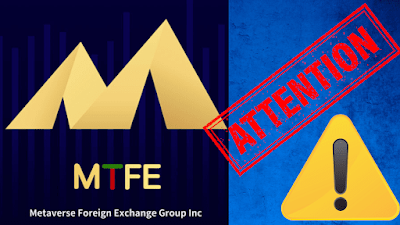Unveiling the Risks: MTFE's Withdrawal Freeze Exposes Offshore Forex Broker's Dubious Operations
Caution is essential in the volatile world of financial investments. The current upheaval surrounding Metaverse Foreign Exchange Group (MTFE) has highlighted the need of conducting thorough due diligence before entering the tempting world of forex trading. This offshore forex broker, which operates without legal licensing, has put investors in a panic by suspending withdrawals due to issues with its Know Your Customer (KYC) system. This essay dives into MTFE's troubling practices and offers light on critical procedures that might assist investors in identifying possible frauds and making educated selections.
MTFE's False Claims and Operations:
MTFE presents as a legal business and claims to be regulated by the Financial Transactions and Reports Analysis Centre of Canada (FINTRAC). It is crucial to understand, however, that FINTRAC is not the Canadian regulating authority for forex brokers. This obvious deception raises questions about the validity and goals of MTFE. The broker, who operates an AI-based investing firm across many nations, entices customers with promises of extraordinary profits through AI trading. Its aggressive referral commission system has also spurred fast expansion.
The Drawback: Withdrawal Freeze and KYC System Issues:
The shocking twist that occurs in MTFE's story is a sudden withdrawal freeze. Investors attracted by the potential of large returns are now trapped as MTFE raises doubts about its KYC procedure. This unexpected decision has caused investors to fear, emphasizing the catastrophic dangers of trusting unregulated firms without proper examination.
The Value of Due Diligence:
One of the most important lessons from the MTFE disaster is the need of thorough research. Many investors, enticed by promises of huge returns and referral bonuses, skipped the crucial step of evaluating the company's credibility. Consider the following precautions to protect your money and financial well-being:
Extensive research: Examine the company's history, licenced, and registration. Confirm its credibility by visiting reputable financial regulatory websites.
Be aware of red flags, which include unreasonably high profits, pushy sales methods, a lack of transparency, and unfavour-able comments from other investors.
Verify Contact Information: Ensure that the company provides verified contact information, such as a physical location and a phone number.
Seek Professional assistance: Seek assistance from financial advisers or legal professionals to assess the legitimacy of the firm and its products.
Caution: Be careful of investments that promise huge returns with low risk. Remember, if anything appears to be too good to be true, it generally is.
Conclusion:
The MTFE issue serves as a sharp reminder that due diligence is an effective deterrent to financial crime. Engaging with businesses that lack adequate licensing and transparency might have disastrous consequences. Before committing their hard-earned assets, investors must conduct study, question, and verify. By following these principles, one may confidently navigate the complicated investing market, protecting their financial future from various frauds and uncertainty.
